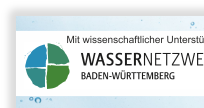Press information on the event
On 8 and 9 October 2019, the Status Colloquium of the Funding Programme Water Research in Baden-Württemberg took place in Stuttgart. At the event, which was attended by about 120 representatives from science, administration and industry, the results of the three researcher networks CHARM, DRIeR and Effect-Net were presented. In addition, the Collaborative Research Center CAMPOS at the University of Tübingen was showcased.
Dr. Caroline Liepert (Ministry of Science, Research and the Arts of the Land of Baden-Württemberg) and Prof. Harald Horn (KIT) opened the colloquium. Subsequently, the project Effect-Net was presented, in which natural and social scientists from the University of Heidelberg, the University of Tübingen and KIT work together. They investigate the effects of pharmaceuticals and artificial sweeteners on fish and invertebrate organisms. The political science subproject investigates how society perceives this topic. A representative survey showed that the German population currently assesses the water quality at their place of residence predominantly as good but fears increasing contamination of waters in the future.
The researcher network CHARM is a joint project of the University of Stuttgart, the University of Konstanz and the University of Freiburg. The interdisciplinary team from engineering, natural and social sciences investigates central challenges of reservoir management. The focus in on reservoirs in the Black Forest and the Franconian Lake District. So far, depth profiles have been recorded, sediment samples and their stabilization by biofilms have been examined, physicochemical parameters and the emission of greenhouse gases have been measured and processes leading to a mass development of toxin production in blue-green algae have been analyzed. In the social science subproject, local actors have been interviewed on the acceptance of reservoirs.
In the morning of the second day, the presentation of the researcher network DRIeR followed, which examines the complex effects of drought on nature and society. The accumulation of drought events in the last two decades clearly underlines the importance of the topic. The researchers from the University of Freiburg, Heidelberg University and the University of Tübingen analyze drought events and their effects since the 16th century and combine them with current process research in order to make visible, in particular, the hidden effects, for example on water quality and biodiversity. The juridical subproject showed that public water law does not yet have any specific tools for drought management. Comparative studies on drought management in Spain and California (USA) also identified interesting starting points for a transfer.
Finally, scientists from the University of Tübingen gave an insight into the research topics of the Collaborative Research Center CRC 1253 CAMPOS 'Catchments as Reactors: Metabolism of Pollutants on the Landscape Scale'.
The lecture programme was complemented by a poster session with about 40 posters by doctoral students working on the projects. Furthermore, a collaborative workshop for early career scientists took place.
Further information in the PROGRAMME
Origin of photo: https://www.hausderwirtschaft.de/fileadmin/_haus_der_wirtschaft/Bilder/Mediathek/HDW_aussen_voll.jpg


